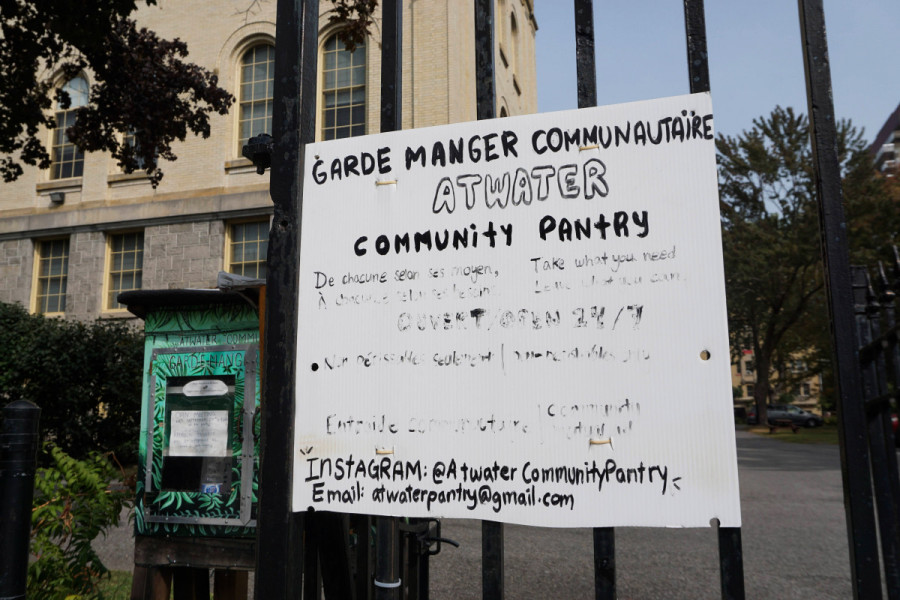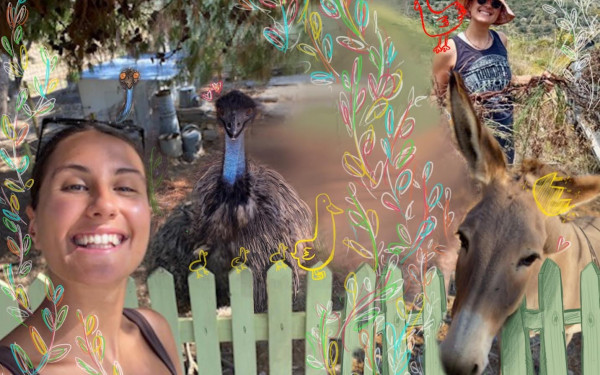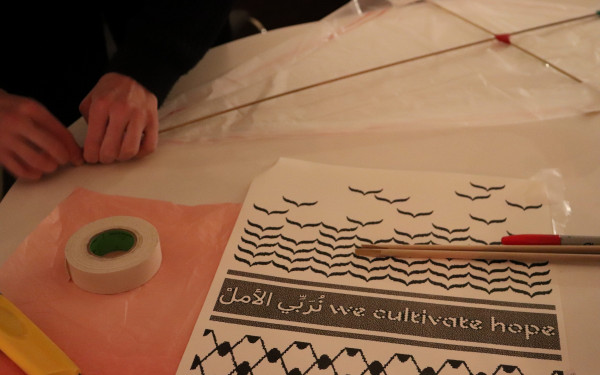The Atwater Community Pantry: “Free food, mutual aid project for all”
How Dawson College students started a pantry for the community, by the community.
Located in the Congrégation de Notre-Dame, the Atwater Community Pantry is a bright green wooden cabinet often stuffed with bread, juice boxes and hygiene products. The pantry was founded by the Green Earth Club, a student association at Dawson College which focuses on helping the community and fighting climate change.
Over five million people used food banks and similar discounted or free food initiatives across Canada per month in 2022 according to Second Harvest, a national food rescue organization. This year, the number is expected to rise to over eight million, a 60 per cent climb.
As mutual aid projects emerged during the pandemic, it sparked inspiration for a group of Dawson College students. One of these students was John Nathaniel Gertler, a former member of the Green Earth Club turned co-founder of the Atwater Community Pantry.
“Some people give from their own pantry at home, some people go to the grocery store and buy things. The main way that the community [pantry] gets filled is volunteers go to bakeries and restaurants to pick up food,” Gertler says.
The pantry welcomes donations from everyone, as long as the food is non-perishable.
“It transforms people’s mindset in the sense that we're here to help each other. We aren’t saying this is mine or this is yours. We are helping everyone,” says Ana Sofia Hernandez, another member of the club.
The pantry is about mutual aid, rather than charity. “There's a lot of people who volunteer and take food from the pantry. That’s the whole idea of mutual aid. It’s not like the rich helping the poor, [but rather] about people supporting one another,” Gertler says.
Other food aid services in Quebec such as the Welcome Hall Mission’s Marché Bon Accueil and The Depot Community Food Centre (formerly the NDG depot) require either membership cards or registration. The Atwater Community Pantry, however, is free for anyone to use.
“There are a lot of people housed in precarious situations who take from the pantry. A lot of [unhoused] people, members of the Atwater community and even I take from the pantry,” Gertler says.
The club organizes community meals to meet the people involved in the project. Due to the pantry’s anonymity, it can sometimes be difficult to know who is interacting with the pantry. “We’re still learning and trying to get better at bringing together the community,” Gertler says.
Gertler and other members of the club went to nearby restaurants and asked if they would like to donate leftover food instead of throwing it out. Shaughnessy Café and Forno West bakery were among those who agreed to contribute to the pantry.
Resilience Montréal, a non-profit day-shelter, also orders food for the pantry. The partnership came about as many students had volunteered there.
Non-perishable food donations include: bagels, granola bars, water and canned food; as well as staples like rice, flour and sugar which are accepted by the pantry. Apart from food, menstrual products are also welcomed by the pantry.
Tianqi Wang, a student at McGill University, volunteers at the Atwater Community Pantry. It was his first time volunteering for the pantry and he had brought a huge bag packed with bread from Forno West bakery.
“I saw the poster near the Atwater metro. I followed their Instagram and then I signed up with the link in their profile,” he says.
Wang hopes that people who have access to surplus food and resources would donate to the less privileged groups in order to reduce inequality.
The pantry’s heavy reliance on volunteers, or lack thereof, has caused problems during the summer when most students are not around to fulfil a needed quota for the pantry. This is just one of many challenges faced by the club. For example, the initiative is based on the Congrégation de Notre-Dame, a women’s religious order founded in 1658. This community was directly associated with the Société de Notre-Dame de Montréal, and helped to found Ville-Marie, now Montreal.
Members of the convent of the Congrégation de Notre-Dame established a boarding school for Indigenous girls which operated with the goal of Indigenous religious conversion to Christianity and cultural adaptation to French norms. The system followed a structure similar to residential schools found in late nineteenth and twentieth century Canada.
Indigenous people make up a large part of the unhoused community in Atwater.
“We see a lot of concrete effects of settler colonialism. We see people struggling with intergenerational trauma, whether it be drug abuse and mental health issues,” Gertler says. He continues by lending his perspective on the congregation’s seedy past:
“As far as we know, the Congrégation de Notre-Dame wasn’t directly involved in setting up or servicing residential schools, but it was a part of a network of catholic institutions [involved in] genocidal activity. We have a discomfort being involved with an institution like that, but at the end of the day, [The congregation has] been really good hosts to us, and haven’t questioned some of our more political activity, which is hard to find, even in a more progressive institution like Dawson.”
While the unsettling history of the congregation lingers on with the pantry, the students have their eyes set on more ambitious projects.
“We [also] organize clothing drives. In the winter, we have a bin where anyone can put their old garments, which we then take to Resilience Montréal,” Hernandez says. “This semester, we plan to organize fundraisers for Guatemala, Hawaii and Morocco. [The countries] are suffering from humanitarian crises and environmental effects of climate change.”
Their Instagram is regularly updated with news about their latest initiatives, ways to get involved and how to sign up as a volunteer.






